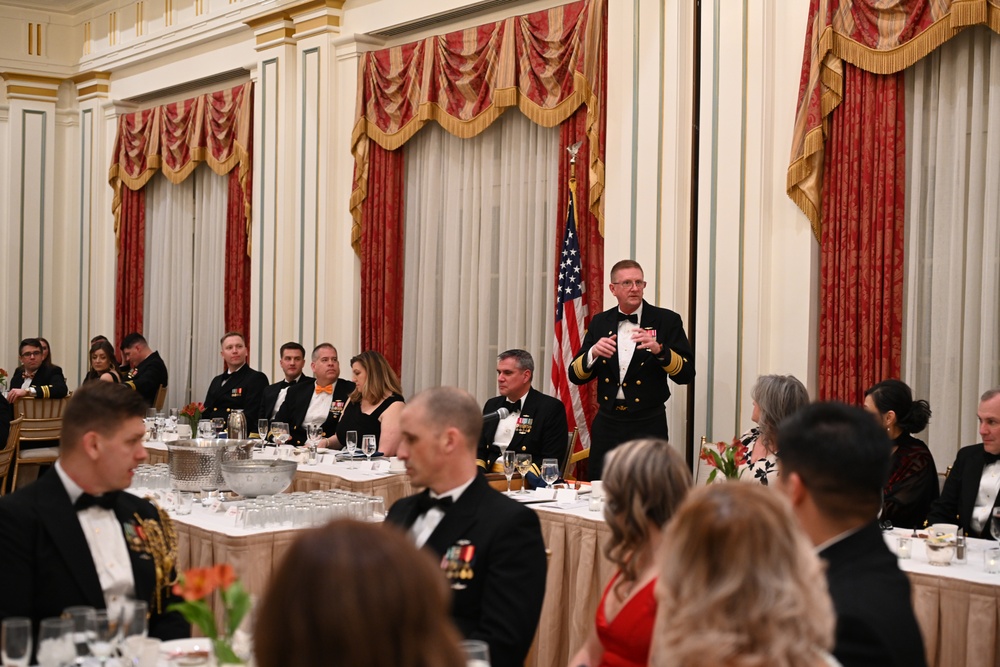WASHINGTON – Cheers and laughter filled the room as military and senior civilian personnel gave toasts, performed tongue-in-cheek odes about the command, and levied “fines” against tablemates who broke the antiquated and mysterious protocols that govern Navy Mess events during Strategic Systems Programs’ (SSP) Dining Out, held at the Army and Navy Club on 1 Feb.
For one Yeoman, it was his first time taking part in this Navy tradition, and the night left an impression.
“Hands down my favorite part was the banter,” said Yeoman Petty Officer 2nd Class Stokely Ralph, Administrative Officer.
The practice of Dining Out is thought to have begun in 16th century England, though some sources believe this tradition was a carryover from the Roman-legions, while others believe it originated within Viking culture. The true origins of Dining Out are shrouded in mystery, much like the ingredients that are added to the night’s infamous “grog,”- traditionally a mixture of fruit punch and spirits that is also provided in a non-alcoholic version at present-day Dining Outs – but historians agree on a few important points. When British Army and Navy units deployed to the U.S. in the 1700s, they carried this tradition over the Atlantic with them and established the tradition in the “New World.” The British, perhaps longing for familiar shores, conducted versions of Dining Outs on a regular, sometimes nightly, basis. In today’s U.S. Navy, the event is regarded as a special occasion to bond with team members and their significant others, and engage in light “shenanigans,” such as pranks, songs, and good-natured jokes, that build esprit de corps.
Each command has its own special blend of Mess traditions, built up over the years. For SSP, hasn’t held a Dining Out in recent history, the evening was an opportunity to establish new traditions while honoring the aspects of Dining Outs that tie all service members together.
One such tradition is the role of “Mr. Vice.” Mr. Vice is typically a senior service member within the command with a strong sense of humor and a healthy tolerance for self-deprecation. Charged with presiding over the night’s ceremonies Mr. Vice, can be found ordering attendees to partake of the mysterious, and often undrinkable, “grog”, leading the singing of songs, or purposefully failing in his attempt to maintain order over the gathering. Cdr. Robert Blanchard, branch head for SSP’s Fire Control and Guidance Branch, took on the part of Mr. Vice with gusto at SSP’s Dining Out.
“Commander Blanchard was absolutely the best person we could have had in the Vice’s position,” remarked Ralph, who admired Blanchard for his thorough embodiment of the role, commenting after the event.
“Bravo Zulu Commander “Captain America” Blanchard!”
Despite the light-hearted nature of the role, Blanchard still found a way to remind those attending of the importance of the SSP team.
“One family, one team, one fight,” he exclaimed during one of his toasts.
Other entertainment throughout the evening included a rousing reenactment of George Washington’s crossing of the Delaware River, which reduced guests to fits of laughter, including Rear Adm. Douglas Williams, director for rest for the Missile Defense Agency, and the “President of the Mess,” Vice Adm. Johnny R. Wolfe, Jr, director of SSP. Having senior civilian leaders present and engaged for the event, alongside military personnel at every rank, was important for Wolfe.
“Doing things like this is so important and we need to do it more often,” said Wolfe.
Dining Outs are closely tied to another Navy tradition, Dining-Ins, which follow a similar script but are exclusive to service members.
Reflecting on his first Dining Out experience, Ralph appreciated the ties back to naval history.
“It pays respect of the history of the service and its traditions,” Ralph said. “I believe [events like these] can motivate personnel by reminding them that they ae part of the same Navy that has achieved so much in the past, and that we can build on that legacy.”
That was echoed by Chief Warrant Officer Nicholas Nemeth, Launcher Branch Deputy Branch Head, who organized the event.
“My hope is that first-time attendees appreciate the value of honoring Navy traditions,” said Nemeth.
“Camaraderie building events are important for a number of reasons but, most importantly, these events ought to be entertaining and leave members wanting to experience it again. I’ve always found Dining-Outs to be a great time. It’s one of my favorite Navy traditions.”
Nemeth’s hard work and planning paid off. In the days after the Dining Out, praise for the event continued.
“I plan on attending next year,” said Ralph.
In 2025, the Navy celebrates its 250th birthday, marking a quarter-century of warfighting excellence. For 250 years, the Navy’s sailors and civilians have been the key ingredient to U.S. maritime dominance, providing an unmatched advantage at sea and onshore. Navy traditions, such as Dining Outs, are an important part of connecting today’s sailors and civilians with the rich history of generations that served before them and provide an opportunity to pass down that heritage to the younger generations within the ranks.
Strategic Systems Programs is the Navy command that provides cradle-to-grave lifecycle support for the sea-based leg of the nation’s nuclear triad. This includes training, systems, equipment, facilities and personnel responsible for ensuring the safety, security, and effectiveness of the nation’s Submarine Launched Ballistic Missile (SLBM) Trident II (D5LE) Strategic Weapon System.
| Date Taken: | 02.07.2025 |
| Date Posted: | 02.07.2025 09:42 |
| Story ID: | 490326 |
| Location: | WASHINGTON, DISTRICT OF COLUMBIA, US |
| Web Views: | 6 |
| Downloads: | 0 |
PUBLIC DOMAIN

This work, Building Traditions, SSP Hosts Dining Out, by Shelby Thompson, identified by DVIDS, must comply with the restrictions shown on https://www.dvidshub.net/about/copyright.








